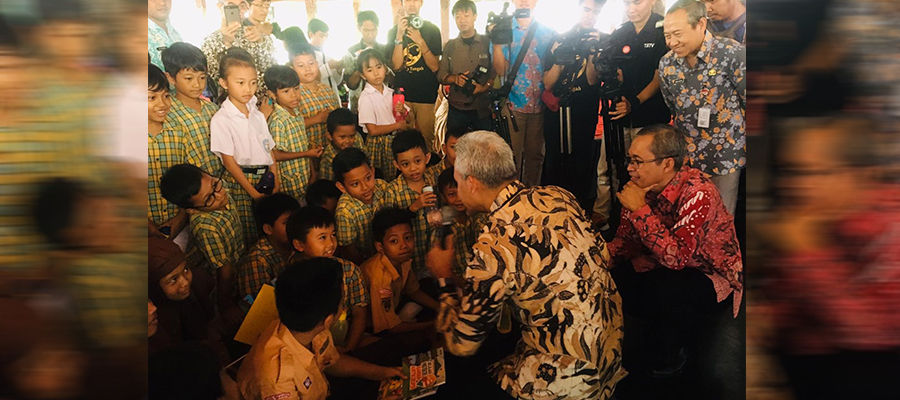The insertion of anticorruption education in the curriculum of elementary and secondary schools in Central Java Province deserves a praise. It was kicked off with the signing of a Gubernatorial Decree, and now 35 regents and mayors in the province signed decrees to implement the subject in elementary school, junior high school, and other schools of the same level.
The signing was witnessed by the Corruption Eradication Commission (KPK) Deputy Chair Alexander Marwata and Central Java Governor Ganjar Pranowo on Friday (Sept. 27) at Surakarta City Hall. It coincided with the launch of KPK’s anticorruption campaign “Bus Roadshow: Exploring the Nation, Building Anticorruption Culture” in the city.
“The bus represents KPK. It travels through the regions mainly as a corruption prevention effort,” Alexander said in his speech.
Moreover, Alexander said that KPK will assist local government to prevent corruption through, among others, early anticorruption education. “KPK has anticorruption education modules that can be downloaded for free. Please use it to instill anticorruption values,” he said.
Meanwhile, Central Java Governor Ganjar Pranowo said the province has pushed for the anticorruption education to become a movement. There are 68 anticorruption facilitators in the province and 340 more are currently trained, he said.
“The approach must be diverse, such as through religious approach, community gathering, or formal approach. We also push for the inclusion of anticorruption theme in university student’s field study,” he said.
Ganjar signed Gubernatorial Decree No. 10/2019 on anticorruption education in Central Java on April 8, 2019. KPK praised 21 other government heads that followed suit: Bogor City, Lamongan Regency, Bondowoso Regency, Probolinggo Regency, Manggarai Regency, Sikka Regency, Lembata Regency, Tulungagung Regency, Kupang City, Kupang Regency, Kotabaru Regency, Garut Regency, Batu City, Lampung Province, Gorontalo City, Cirebon Regency, Bekasi City, Karawang Regency, Bekasi Regency, Blitar City, and Malang City.
The bylaws are the legal basis for the implementation of anticorruption education in 9,105 elementary schools, 2,443 junior high schools, and 3,456 senior high schools/vocational high schools and other schools at the same levels.
At least four stages are required to implement anticorruption education: regulation, dissemination, implementation and monitoring and evaluation. The first two stages have been done in parallel. These followed up the National Coordination Meeting on Anticorruption Education in December 2018. The Meeting involved four ministries, namely the Ministry of Education and Culture; the Ministry of Research, Technology and High Education; the Ministry of Religious Affairs; and the Ministry of Home Affairs.
These ministries have published ministerial decrees according to the action plan agreed beforehand, and create policies that require the insertion of the values of character building and anticorruption culture into the curriculum of every level of education, by June 2019 at the latest.
KPK encouraged other regional governments to issue the same regulation. Gubernatorial Decree is the legal basis for anticorruption education implementation at secondary education and education for students with special needs, while City/Regency Bylaw is for elementary school and junior high school levels. Apart from pushing for regulation issuance, KPK also disseminate information by, among others, conducting training for Civic teachers of senior high school. The training is in collaboration with the Association of Civic Teachers of Public Senior High School and Islamic Senior High School to prepare them in teaching anticorruption values in their respective schools.
This year, the training has been conducted in 10 focus regions: Jakarta, North Sumatra, Riau, West Java, Central Java, East Java, South Kalimantan, Gorontalo, East Nusa Tenggara, and Bali.
